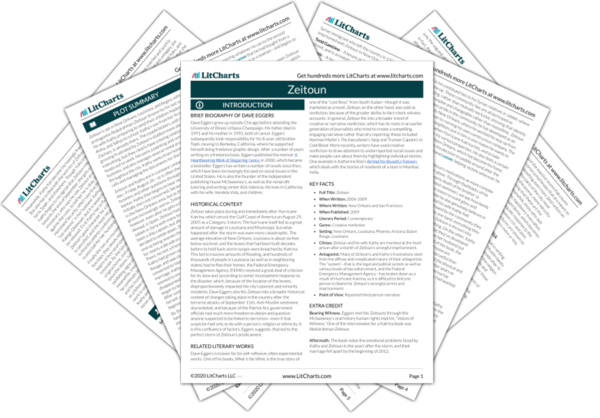Hurricanes like Katrina are known as “natural disasters,” as the events themselves are outside of human control. Zeitoun is certainly aware of this, and he holds great respect for nature, understanding the powerful forces of water that both killed his older brother (who drowned many years earlier) and wrought such devastation on New Orleans. But the book also shows that there is always a human component to such tragedies as well.
In New Orleans, it is not just the massive storm that causes great damage—the poorly constructed levees that are meant to hold back flooding break, unleashing even more destruction on much of the city. In addition, the parts of the city most vulnerable to such flooding are the poorer, more minority-populated neighborhoods, meaning that these are the communities that suffer most. Meanwhile, those who lack resources to leave the city, given the mandatory evacuation, are overwhelmingly housed in the Superdome, which becomes a disastrous referendum on the inadequate response to the storm. Nature doesn’t discriminate between rich and poor, white and black, but existing human structures are shown to create vast differences between who suffers more or less.
Human vs. Natural Tragedy ThemeTracker

Human vs. Natural Tragedy Quotes in Zeitoun
But there was the canoe. He saw it, floating above the yard, tethered to the house. Amid the devastation of the city, standing on the roof of his drowned home, Zeitoun felt something like inspiration. He imagined floating, alone, through the streets of his city. In a way, this was a new world, uncharted. He could be an explorer. He could see things first.

Unlock explanations and citation info for this and every other Zeitoun quote.
Plus so much more...
Get LitCharts A+Had they been in a fan boat, the noise overwhelming, they would have heard nothing. They would have passed by, and the woman likely would not have survived another night. It was the very nature of this small, silent craft that allowed them to hear the quietest cries. The canoe was good, the silence was crucial.
When Zeitoun and the others entered the main room of the station, immediately fifty pairs of eyes, those of soldiers and police officers and military personnel, were upon them. There were no other civilians inside. It was as if the entire operation, this bus station-turned-military base, had been arranged for them.
Who did this work? Were there contractors and laborers working around the clock on a prison days after the hurricane? It was mind-boggling. It was all the more remarkable given that while the construction was taking place, on September 2, 3, and 4, thousands of residents were being plucked from rooftops, were being discovered alive and dead in attics.
Kathy often worried about the National Guard and other soldiers returning to the United States after time in Iraq and Afghanistan. She warned him about passing groups of soldiers in airports, about walking near National Guard offices. “They’re trained to kill people like you,” she would say to Zeitoun, only half-joking. She had not wanted their family to become collateral damage in a war that had no discernible fronts, no real shape, and no rules.
He thought of bycatch. It was a fishing term. They’d used it when he was a boy, fishing for sardines by the light of the moon they’d made. When they pulled in the net, there were thousands of sardines, of course, but there were other creatures too, life they had not intended to catch and for which they had no use. Often they would not know until too late.
They held each other for a long moment. She could feel his shoulder blades, his ribs. His neck seemed so thin and fragile, his arms skeletal. She pulled back, and his eyes were the same—green, long-lashed, touched with honey—but they were tired, defeated. She had never seen this in him. He had been broken.
The Zeitouns have lived in seven apartments and houses since the storm. Their Dublin Street office was leveled and is now a parking lot. The house on Dart is still unfinished. They are tired.
Gonzalez talked about how the system is supposed to work: police officers investigate, make arrests, and then hand the process over to the judicial system. Under normal circumstances, if the men were innocent, he maintained, they would have been given a phone call and the opportunity to post bail. “They should have gotten a phone call,” he said.
On the one hand, knowing that these two police officers had not purposely hunted and arrested a man because he was Middle Eastern gave them some comfort. But knowing that Zeitoun’s ordeal was caused instead by systemic ignorance and malfunction—and perhaps long-festering paranoia on the part of the National Guard and whatever other agencies were involved—was unsettling. It said, quite clearly, that this wasn’t a case of a bad apple or two in the barrel. The barrel itself was rotten.
To dial a number given to you by a man in a cage, to tell the voice on the other end, “I saw him.” Is that complicated? Is that an act of great heroism in the United States of America? It should not be so.
As he drives through the city during the day and dreams of it at night, his mind vaults into glorious reveries—he envisions this city and this country not just as it was, but better, far better. It can be.











